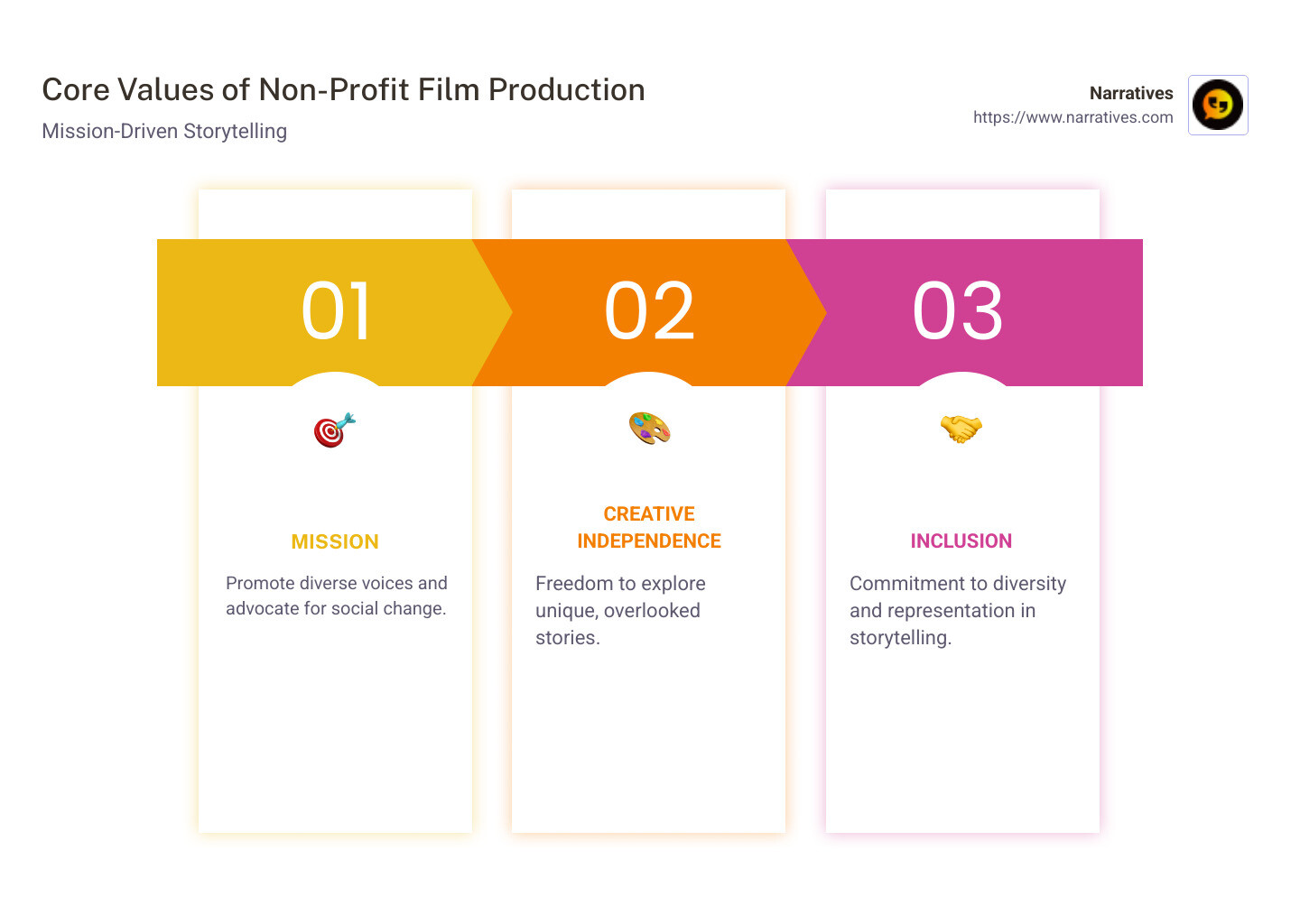From Script to Service: Making Your Film Production Company Non-Profit

Mission and Vision: The Heart of Non Profit Film Production Companies
A non profit film production company is a purpose-driven entity that transcends traditional filmmaking by focusing on mission-oriented storytelling. These organizations blend creativity with community service, allowing them to foster creative independence while advocating for important societal issues.
- Mission: To champion diverse voices and promote social change through powerful narratives.
- Creative Independence: Freedom to explore unique stories that might be overlooked in commercial film industries.
- Inclusion: A commitment to diversity, ensuring all voices are heard and represented.
These companies serve as catalysts for change by empowering communities and promoting inclusion. They prioritize storytelling that reflects diverse experiences, ultimately educating and inspiring audiences. Through their work, they challenge societal norms and provide platforms for unheard voices.
By embracing a non-profit model, these organizations are not just making films; they are crafting a movement towards a more equitable society, one frame at a time.

Understanding Non-Profit Film Production Companies
A non profit film production company operates under a unique framework that sets it apart from its for-profit counterparts. These organizations are typically registered as 501(c)(3) entities, a status that offers them certain benefits and aligns their operations with their mission-driven goals.
The 501(c)(3) Advantage
The 501(c)(3) designation is crucial for any non-profit organization, including those in the film industry. This status provides tax-exempt benefits, allowing the organization to reinvest more resources into their projects. It also opens up opportunities for funding through grants and donations, which might not be available to for-profit companies.
- Tax Relief: Non-profit film production companies can use tax-exempt status to funnel more funds into projects that matter.
- Grant Eligibility: With 501(c)(3) status, organizations become eligible for various grants aimed at supporting educational and cultural initiatives.
Navigating the Film Industry as a Non-Profit
In the competitive world of film, non-profit production companies carve out a niche by focusing on content that serves a greater purpose. Their projects often highlight social issues, promote diversity, and aim to educate and inspire.
Mission-Driven Content: Non-profit film companies prioritize storytelling that can drive social change, focusing on topics like environmental sustainability or social justice. For example, Narratives supports organizations that promote environmental sustainability and aid vulnerable populations.
Community Engagement: These companies often engage directly with communities, involving them in the filmmaking process and ensuring that the stories told are authentic and impactful.
Bridging the Gap with Non-Profit Film Production
By operating as a non profit film production company, these organizations can focus on more than just the bottom line. They aim to create films that not only entertain but also educate and advocate for change. This model allows them to:
- Build a Diverse Audience: Through content that resonates with a wide range of viewers, non-profit film companies attract supporters who are passionate about the causes they champion.
- Foster Collaborative Storytelling: The non-profit model encourages partnerships with other organizations, filmmakers, and community groups to produce content that reflects a variety of perspectives.
Non-profit film production companies are redefining the landscape of the film industry, using their unique status to champion causes and tell stories that might otherwise go unheard. Their commitment to inclusion and creative independence ensures that they remain at the forefront of meaningful storytelling.
Benefits of Becoming a Non-Profit Film Production Company
Transitioning to a non profit film production company offers several unique advantages that can significantly impact your organization’s success and sustainability. Here's a closer look at these benefits:
Tax Relief
One of the most immediate benefits of becoming a non-profit is tax relief. As a 501(c)(3) organization, your company can enjoy tax-exempt status. This means more of your resources can be directed towards creating impactful films rather than paying taxes.
Additionally, this status can open up access to grants and donations. Many funding sources are specifically custom for non-profits, providing financial support that for-profit entities can't access. This can be crucial in sustaining long-term projects and initiatives.
Audience Building
Non-profit film production companies are uniquely positioned to build a dedicated audience. By focusing on mission-driven content, these companies can connect with viewers who are passionate about the causes being portrayed.
This approach not only attracts viewers but also turns them into advocates for your mission. They are more likely to share your films, attend screenings, and engage with your content on social media. The Jane Goodall Institute, for instance, used a simple video to achieve 28,000 views and 500 shares, demonstrating the power of relatable, cause-driven storytelling.
Embracing Diversity
Diversity is more than a buzzword for non-profit film companies; it’s a core value. These organizations often prioritize stories that highlight underrepresented voices and experiences. By doing so, they foster an inclusive environment that reflects a broad spectrum of perspectives.
This commitment to diversity not only enriches the storytelling but also broadens the appeal of the films. It invites a wider audience to engage with the content, building a community around shared values and goals.
Moreover, initiatives like Project Involve demonstrate how non-profits can actively support diverse filmmakers, ensuring that a variety of voices are heard and celebrated in the industry.
Conclusion
By embracing the non-profit model, film production companies can leverage tax benefits, build a passionate audience, and champion diversity in storytelling. This approach not only sustains the organization but also amplifies its impact, ensuring that meaningful stories reach the audiences that need them most.
Steps to Transition to a Non-Profit Film Production Company
Transitioning to a non profit film production company involves a few key steps. Each step is crucial to ensure your company operates legally and effectively under the non-profit model.
Certification
The first step is obtaining certification as a 501(c)(3) organization. This status is essential for tax exemption and eligibility for grants and donations. Here's how to get started:
Incorporate as a Non-Profit: File articles of incorporation in your state. This establishes your organization as a legal entity.
Apply for Tax-Exempt Status: Submit Form 1023 to the IRS to apply for 501(c)(3) status. This form outlines your mission and how it aligns with non-profit purposes.
State Compliance: Ensure compliance with state-specific requirements, like registering for charitable solicitations if you plan to fundraise.
Financing Structures
Non-profit film production companies rely on diverse financing structures to sustain their projects. Here are some common avenues:
Grants: Seek grants from foundations and government programs. These funds are often earmarked for specific causes or projects.
Donations: Engage with individual donors and philanthropic organizations. Building relationships with supporters is key to securing ongoing financial support.
Sponsorships: Partner with companies that align with your mission. They can provide financial support in exchange for brand visibility within your films.
Crowdfunding: Platforms like Kickstarter or Indiegogo can be effective for raising funds for specific projects. They also help build a community of supporters.
Legal Considerations
Navigating legal considerations is crucial for a smooth transition. Here are some key areas to focus on:
Governance Structure: Establish a board of directors. This group will oversee the organization's activities and ensure adherence to its mission.
Bylaws: Draft bylaws that outline the rules and procedures for operating your non-profit. These documents guide decision-making and governance.
Compliance: Stay informed about regulations affecting non-profits. This includes annual reporting requirements and maintaining good standing with the IRS and state agencies.
Intellectual Property: Ensure that all creative works, such as scripts and films, are properly protected under copyright law. This protects your company’s assets and ensures creators receive credit.
Transitioning to a non-profit model can be complex, but with careful planning and adherence to these steps, your film production company can thrive and make a significant impact.
Successful Non-Profit Film Production Models
Non-profit film production companies can thrive by embracing community-driven projects, educational initiatives, and collaborative storytelling. Let's explore how these models make a difference.
Community-Driven Projects
Community-driven projects are at the heart of many successful non-profit film production companies. These projects involve the local community in every step of the filmmaking process, from concept to screening. This approach not only empowers community members but also ensures that their voices and stories are authentically represented.
For example, some organizations provide technical training and media literacy skills to youth from underserved communities. By involving these young filmmakers in the creation of films, they foster a sense of ownership and pride in the final product. This model not only produces powerful films but also builds skills and confidence among participants.
Educational Initiatives
Educational initiatives are another cornerstone of successful non-profit film production. These initiatives aim to educate and inspire audiences through film. By creating educational content, non-profit film production companies can tackle important social issues and promote awareness.
Some organizations develop classroom resources such as lesson plans and curriculum guides to integrate digital storytelling into education. This not only enriches the learning experience but also encourages students to engage with media critically and creatively.
Collaborative Storytelling
Collaborative storytelling involves bringing together diverse voices and perspectives to create a richer narrative. This model encourages filmmakers to work with a wide range of contributors, including other non-profits, community organizations, and educational institutions.
Narratives exemplifies this approach by blending text, audio, animation, photography, and video into cohesive stories. By collaborating with local nonprofits and using multimedia elements, they present engaging and modern narratives that resonate with audiences.
These successful models demonstrate how non-profit film production companies can create impactful content that resonates with audiences while staying true to their mission. By focusing on community involvement, education, and collaboration, these companies not only produce compelling films but also drive social change.
Next, we'll address common questions about non-profit film production companies, including the types of content they create and the costs involved.
Frequently Asked Questions about Non-Profit Film Production Companies
Can a production company be a non-profit?
Yes, a production company can indeed operate as a non-profit. These organizations are structured under the 501(c)(3) designation, which means they are recognized as tax-exempt by the IRS. The primary goal of a non profit film production company is not to generate profit but to serve a mission, often focused on social impact, education, or community engagement. By becoming a nonprofit, these companies can access various benefits like tax relief and grant opportunities, which can be reinvested into producing meaningful content.
What types of content do non-profit film production companies create?
Non-profit film production companies create a wide array of content that aligns with their mission-driven goals. Fundraising videos are a crucial type of content, designed to inspire donations and support by telling compelling stories about the organization's work and impact. These videos often highlight personal stories of change, perseverance, and hope, resonating emotionally with viewers.
Educational content is another significant area for these companies. This can include documentaries, instructional videos, and public service announcements (PSAs) aimed at raising awareness and educating the public on various social issues. For instance, a non-profit might produce a series of educational videos on environmental conservation, aiming to inform and inspire action among viewers.
Additionally, non-profit film production companies may create branded content for other organizations, helping them communicate their missions effectively through film.
How much does it cost to hire a non-profit film production company?
The cost of hiring a non profit film production company can vary widely based on several factors, including production rates, equipment, and the length of the video. Generally, large-scale video productions start at around $30,000. However, request a quote from the company to get an accurate estimate custom to your specific project requirements.
Video length is a significant factor in determining costs. Shorter videos, like those typically produced by companies like Demo Duck, may be more budget-friendly. Their videos usually run around two minutes but still manage to convey powerful messages effectively.

When budgeting for a project, consider the potential return on investment. High-quality video content can significantly increase engagement, drive donations, and improve brand awareness, making it a worthwhile investment for many organizations.
Next, we'll dig into the conclusion, where we'll explore how Narratives uses storytelling to create social impact through its non-profit film production efforts.
Conclusion
Narratives is more than just a film production company; it's a catalyst for change. Our mission is to use storytelling as a tool for social impact, elevating voices that often go unheard. We believe in the power of stories to inspire action, build trust, and increase visibility for non-profits and purpose-driven organizations. By partnering with us, you're not just creating a film—you're crafting a narrative that can transform communities and drive meaningful change.
Storytelling is at the heart of what we do. We understand that a well-told story can captivate audiences and create emotional connections. Whether it's through a fundraising video that highlights the journey of a community or an educational documentary that sheds light on critical issues, our goal is to create content that resonates deeply with viewers. Our team is dedicated to ensuring that every project we undertake aligns with our core values of diversity, innovation, and inclusion.
The social impact of our work is profound. By focusing on underrepresented voices, we aim to foster a culture of empathy and understanding. Our projects are designed not just to inform, but to inspire viewers to take action and support causes they care about. By leveraging the power of film and multimedia, we help non-profits amplify their messages and achieve their goals.
When content is king, partnering with a non profit film production company like Narratives can make all the difference. We invite you to learn more about our services and find how we can help you tell your story in a way that makes an impact. Together, let's use the power of storytelling to change the world.


